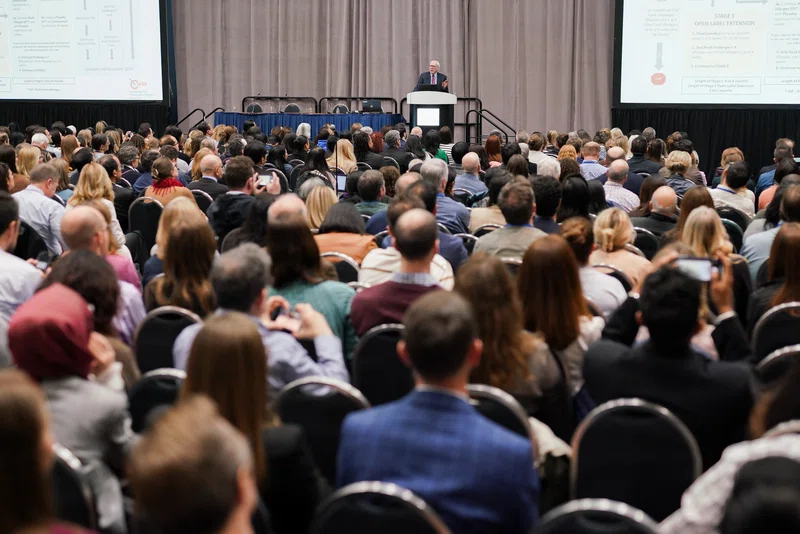


result
Groundbreaking Food Allergy Research Presented at 2024 AAAAI Annual Meeting, Including Research Behind Omalizumab’s FDA Approval for Food Allergy

Robert A. Wood, MD, FAAAAI, speaking at a Late Breaking Symposium at the 2024 AAAAI Annual Meeting.
Anticipation was thick in the air as hundreds of people gathered for a Late Breaking Symposium at the 2024 AAAAI Annual Meeting featuring Robert A. Wood, MD, FAAAAI. He’d been invited to speak about new research, “Omalizumab for the Treatment of Multiple Food Allergies”, which was simultaneously published in The New England Journal of Medicine.
During his talk, Dr. Wood provided details on the new research that is being called game-changing for patients with food allergy. His presentation was met with a standing ovation.
Dr. Wood’s presentation and the excitement it brought to the 2024 AAAAI Annual Meeting is indicative of the ways AAAAI members are leading the way in research in food allergy and other allergic and immunologic conditions to provide optimal care for patients.
On February 16, the FDA approved omalizumab for the reduction of allergic reactions that may occur from accidental exposure to multiple food allergens. “FDA approval was the goal of the study from the start, so to see this come through was amazing,” said Dr. Wood. “The truly amazing part though was not our success, but the fact that we could finally offer our patients a safe and effective option to treat their food allergies.”
Dr. Wood started work on the OUTMATCH study, which led to the approval, back in June of 2017. While the study got underway in August of 2019, COVID-19 caused major delays in the research - especially because this study could not be done remotely.
At the point when COVID-19 forced delays, 42 patients were currently getting injections for the study and had to pause. If they wanted to participate when COVID-19 restrictions eased and research could begin again, they needed to start from the beginning. All 42 patients opted to return.
Robert A. Wood, MD, FAAAAI
What does it say that all 42 patients returned? “It says two things,” Dr. Wood said. “The first is obvious, showing the commitment that each participant felt for this study. The second is less obvious but actually more important – it shows the personal relationships that develop in a complex study like this between the patients and the study staff/coordinators.”
Now that the medication has been approved, allergist/immunologists are already seeing trends in terms of patients more likely to be interested in the treatment option. Patients likely to benefit the most are those with multiple food allergies, as well as those with common comorbidities that can also be treated using omalizumab including chronic rhinosinusitis and allergic asthma. Age is also a factor, with allergist/immunologists seeing a lot of interest from college-aged patients.
Dr. Wood presented results from Phase One at the 2024 AAAAI Annual Meeting and is currently working on Phase Two and Phase Three. Phase Two will compare the results of patients receiving omalizumab with placebo immunotherapy (OIT), to patients receiving multi-food OIT after being treated with omalizumab for eight weeks prior to the OIT, and for the first eight weeks of OIT. After that, they receive the OIT and placebo injections for 44 weeks.
Dr. Wood hopes to have results from Phase Two ready to present at the 2025 AAAAI / WAO Joint Congress in San Diego, CA, USA. Phase Three will examine if patients could begin to eat allergic foods under the protection of omalizumab, though researchers will not be able to report on data from that phase for quite some time.
OUTMATCH was only one of the many groundbreaking food allergy studies presented during the 2024 AAAAI Annual Meeting. Nasal powder epinephrine continued to be a hot topic, with one study finding that nasal powder formulations of epinephrine demonstrated superior stability and comparable plasma exposure to EpiPens. A needle-free option could address some of the shortcomings of autoinjectors and would be life-changing for food allergy patients.
There were also many fascinating studies presented on OIT, including one that found that baked milk oral immunotherapy was well tolerated and induced substantial desensitization to both baked and unheated milk. With cow's milk allergy being among the most common food allergies in young children and with no current treatment options, this research could lead to potential treatment paths.
One study examined acid-suppressive medications and their impact on food allergy, finding that patients who were prescribed proton pump inhibitors in infancy demonstrated increased food allergy and anaphylaxis risk. Infant exposure to acid-suppressive medication was associated with a nearly 6-fold increased risk of food allergy diagnosis in early childhood.
There are a lot of exciting advances right now in the world of food allergy. If you want to browse all the abstracts presented at the 2024 AAAAI Annual Meeting, you can do so here, in the online supplement to The Journal of Allergy and Clinical Immunology.





